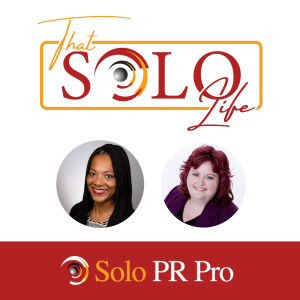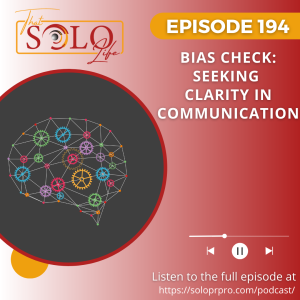As communicators we are always aware of making sure we are navigating our own inherent biases. The same is true as we counsel our clients. But in today’s society there is whole new layer where biases are being systematized and institutionalized. What does this mean for us as communicators? How to we navigate these tricky waters while also honoring the nuance necessary for clear communication? We discuss this weighty topic in today’s episode.
Read the Washington Post Op-ed referenced in today’s episode.
Transcript
Michelle Kane (00:02):
Thank you for joining us for this episode of That Solo Life, the podcast for PR pros and marketers who work for themselves, people like me, Michelle Kane, with VoiceMatters, and my ever steady co-host Karen Swim of Solo PR Pro. Hi Karen, how are you today?
Karen Swim (00:17):
I'm great, Michelle. How are you doing?
Michelle Kane (00:19):
Hi. I'm doing well, doing well. Spring has sprung and brought all the pollen with it, so apologies for any congestion you may hear, but that's okay, .
Karen Swim (00:31):
Yeah,
Michelle Kane (00:31):
It's worth it for the beauty . So yeah, I'm doing well and I'm excited about today's topic. It's pretty juicy, so we're going to try and keep it to our usual compact nugget as our audience can listen as they go about their day, we jokingly refer to ourselves as your walking partners, so yes. As you're on your daily walk, here we go. We're going to talk about institutional bias.
Karen Swim (00:59):
Yeah.
Michelle Kane (01:00):
I said it was juicy .
Karen Swim (01:03):
That's a weighty topic. I mean, we could, this is one of those topics that I love for us to be in a room together and just have like rich discussions about it. We really want to just talk about some of the things that we're seeing and reading, and at least put it on your mind to be thinking through, and having those discussions with other solos and industry leaders and clients, and really think about what this means for the future.
Michelle Kane (01:33):
Because, at the center of it, it speaks to what is the general truth, right? What are those things we can all agree on as a society and as our society continues to be polarized, how that can be really damaging in the short and long run. And the beauty of it is, as communicators, we can have a seat at this table, and yet again, help guide our clients, people in our sphere through these conversations. I know, Karen, you had brought up, there was an article on the Washington Post about, was it a Stanford law student? I think?
Karen Swim (02:19):
Yeah, so there were two things recently that in reading through them, really drove this home to me of the impact and the potential emerging trends. So one was this Washington Post article. It was an opinion piece from a Stanford law student that talked about how the very charged, polarized political environment has infiltrated the campus. And if you go to the Washington Post, there are actually several articles about this in law schools from another columnist as well. But this particular piece was again, an opinion. And this woman talked about how people are being forced into us versus them very much like the rest of the world. But where it got really interesting for me was how she described that when if you were of a certain political party, people expected you to be an attorney. And if you said that you wanted to be a prosecutor, you were bullied for it, ostracized, as this particular group saw this as evil. And conversely, on the other side of the political party, on the other side of the aisle, if you wanted to be an attorney, it labeled you in a particular ilk. So the fact that bias could be impacting choice of profession is a very scary thing, particularly when we're talking about our justice system, because I believe that this is just a mirror of other institutions in our society. So, at the educational level, if we're creating bias and that bias is leading people to lean in a particular direction for how they would use their skillset in their careers, that's problematic because we need diversity of thought in every area. And the second thing that really brought this home was Twitter's code being released. And we knew that that was coming. They announced that they were going to open up the code and reading takes from people that read through the code.
I have not read through the code myself. So let me say that I can read code. I'm not an expert in it, but I do know how to read code. I haven't read it myself, but it really brought out and articulated the bias that's written into the code. Now, Twitter is not alone in this. We know, and we've talked about this for years, we've talked about bias and AI, we've talked about bias and algorithms. And so all of this led us to really start to think very deeply about, as communicators, we know that we already have to work to ensure that we are navigating our own inherent biases, and that we are ensuring that clients aren't operating with biases. But now we have this whole new layer where biases being systematized and institutionalized. And so what does that mean for us as communicators? How do we navigate these tricky new waters to be able to still communicate effectively to be able to articulate points, but to be nuanced so that we are not further amplifying the, the,
Michelle Kane (05:59):
the noise
Karen Swim (06:01):
the noise, the polarization. Yes. That's really taken hold.
Michelle Kane (06:05):
Yeah. And I think the first step is to be cognizant that it is taking hold in such a way, because especially as you said in the justice system, that's highly disturbing. I think, I hope it's not a completely lost art that we can assume a certain point of view in our work that is separate from whatever personal thoughts we may have. And I'm not talking about things that are just inherently right versus wrong. I mean, there are some things that are no, that should never be right,
Karen Swim (06:43):
, yes.
Michelle Kane (06:44):
But just in personal preferences or, do you call it purity tests of, well, if I disagree with this, you know, institution or group about this point, then I must act in this major way in every aspect of my life. I see that at the local level of, well, this organization is taking money to do this private thing, and I am now not going to go there anymore. And I'm thinking, at the cost of what you're going to damage the total economic development of a region, because of taking such a wide view, we really need to maintain nuance. And nuance has been slowly chipped away at for quite some time. I mean, I'm thinking even back to late nineties, early two thousands. And maybe even before that when I wasn't paying as much attention as I should have. And we really need to keep it front of mind and, and really be the bearers of how we need to think things through.
Karen Swim (07:51):
Yes. And you know, I love language, I write, and part of my personal writing is I like to play with language, but what's been really apparent, and you're right, the shift is not overnight. I know that we love to tie this to a certain timeframe in our political history, but this has not been an overnight switch. We have always had this ability to weaponize language. And for as far back as man has existed, I mean, what is bullying? You know, it's really, sometimes the bullying is not physical. It's really verbal bullying. And so we have this ability to do this as human beings. And if you are working in an arena that is political, obviously you're going to adopt the language of your followers to speak to them.
But I find we tend to be very aggressive these days. And so there are now these code words that will signal whether you are progressive or liberal, conservative, whether you're a Democrat or a Republican. And I think that's awful because I truly, in my heart of heart believes, and it's funny, the Stanford law school op-ed said the same thing, that, most people are not us or them on campus. They're somewhere in that middle. And I believe that that's most of the country, but many people feel bullied into staying silent or trying to navigate these tricky waters so that they're not labeled either way. For many of us if you work with a technology company, you’re B2B, you’re B2C, you don't really care what political party people are. And you're not trying to speak to politics, you're trying to speak to your target audience, which comprises both sides of the aisle. One of the easiest things that you can do, obviously, is to not use those trigger words. I find it very troubling that now we have to restrict our language because some groups have adopted this as their mantras, their code words to signal that we're one of you. And I don't know how this mob mentality has just really taken over in such a negative and toxic way. But as communicators, we can't fall prey to it. Even if we belong to one of these parties, even if we are all in on that party, we cannot let that impact the work that we do.
Michelle Kane (10:50):
A hundred percent. And, as communicators, I know for me, I am always -- from the beginning of when I started out in this profession -- always conscious of not just how words communicate, but everything you present. Everything communicates. And, it's heightened now, and to your point as well, most businesses I know, they want to serve everybody. Is your money green? Okay. Yeah.
Karen Swim (11:27):
And, not to be confused with being values based because…
Michelle Kane (11:32):
Correct.
Karen Swim (11:34):
…I advocate for companies having a very clear North Star, for having a mission and a vision that shows up in every single part of the organization and is reinforced. So this is not being values-based. We're talking about being divisive and polarizing on purpose, unless that is your mission. And there are companies that do very much have that mission, different story. But even in those instances, when you are mission driven and it's in the political arena, and you are a social justice organization, I'm always a fan of communicating with clarity and not communicating to divide. Because, and this is just my personal viewpoint and, and I'm going to just say that this is opinion, it's not fact. But I truly believe that when we communicate with clarity, and we're not communicating to divide people, that it actually is stronger for whatever we're trying to achieve. Because where change really happens is when human beings can truly communicate and discuss with one another.
So when you set the table for not argument, but for thought and discussion, that's where you can really move the needle. And I think I've shared this story on this podcast before, and my apologies, I cannot remember what journalist wrote this, but he wrote about this whole phenomena, and he talked about when he was arguing with a cab driver in Israel and how they argued for like 30 minutes. And it was great because this was one-on-one discussion. They had different viewpoints, but at the end of the ride, they were able to shake hands and they both had learned something from the other and really come to an understanding of the other person's perspective. And each of them had, you know, changed their perspective slightly based on this discussion. But it was discussion. And so I think that if we can move away from inciting argument or simply communicating for agreement, communicating for validation, which is something very different for me.
And that's a skillset, and that's something that as a communicator, you may be called to do again, depending on the purpose of the communication and who your client is. But it's not where I believe that we should live. We should want to not necessarily validate, because you need to be clear and have your point of view and be able, again, to articulate that. But is there room for people to go, “Huh, never thought about that,” or, “Wow, that's really interesting.” Discussion creates memorable moments, right? Telling those stories in a way that people can relate to makes them remember the brand that you're actually talking about, or remember the person, the spokesperson. Those are all things that are important to our profession. And I am so afraid, and the reason that we really wanted to address this today is I think that we really need to have our eyes wide open and to begin to fight back on this thing that is taking hold in our society.
And it's getting deeper and deeper. And it just, it, it's frightening to me. It's frightening to me that one day we might see communicators who are only of one political party. Could that happen? Absolutely. It could. Because if we're educating people in a system that is being set up to create biases and to create us versus them, what does that mean for the future of every single profession on this earth? Does this mean that you now have to, will we see a future where if you have a certain set of belief systems politically, that you're going to have to seek out doctors who share that opinion because they're going to treat you differently?
Michelle Kane (15:43):
That's already happening, isn't it?
Karen Swim (15:45):
I was going to say, yep. We already have bias in our healthcare system that Yes, we do. I mean, it just, this goes on and on and on. And some of this is already happening, and we can't dismiss this as a DEI and B agenda because it's not, it's not political inclusivity. It's human beings getting back to humanity and understanding how to talk to people. Not at them.
Michelle Kane (16:14):
Right. And I think of the two pillars, purpose and intent, and I think we have to be laser focused as we craft our communications, as we discern what someone is communicating. What is their true purpose? What is their intent? Is it to be clear? Is it to be helpful? Is it to hopefully engage with a target audience? Or is it to create noise and argument, arguments and chaos. I have to bring the pop culture element into it. There was that scene with Michael Caine in Batman talking about the Joker. Some people just want to watch it all burn. And we have too much of that going on in our society. Too much of that rhetoric that is a lot of noise and it's a lot of grandstanding for personal gain. I think back to when Crossfire was still a thing and Jon Stewart was on and they wanted him to be the comedy guy, and, and he laid into both sides and said, we just want the truth. That's all we want. And yes. Are we going to have different viewpoints about what truth is? Sure. We all have different experiences, but I think if we're all cognizant that this does exist, that your experience may not be the same as someone else's, that doesn't mean that they are wrong.
Karen Swim (17:46):
Yes.
Michelle Kane (17:47):
Or that they're making it up.
Karen Swim (17:48):
Yes. Trust them. Yes. And this, to me, that bias can lead to judgment that's really unfair. And then you're writing off an entire swath of your audience that really could be valuable. And I hate to call it communicating to the middle, but really that's what it is. It's communicating to the middle. There's such beauty in that because being able to create environments and create communications that people can actually share and discuss regardless of where they fall on that spectrum is at the heart of human community. And we don't want to stay stuck in that silo, and we don't want to create silos. We want to invite people who think differently to show up, to participate, to engage, because we all are better when we're exposed to things that are a little bit different than maybe the way that we think, or even the way that we believe.
And so, I don't ever fear, I mean, it's, sometimes I'll see that, and I've been exposed to this where people are like, “How could you talk to these people?” Uh, because they're people. And because I learn something and because I see every human being as a human being, period. That's it. Do I see color? Of course I do, because I see the person. And so I see the things that this person represents, whether it's their ability or their race, their height, I see it all, but they're a human being, right? And so I operate from that perspective, and I think that we need to really take a step back and get back to the basics. But here's the great thing, once again, my public relations heroes. I am just continually proud to be in this job that is super challenging.
Let's face it, we have a very challenging job. We might not be rocket scientists and we might not have literal life and death at our fingertips most of the time. But our jobs are stressful, they're complex, they're needed, and we are just, we sit in a seat that brings with it so much honor, because day after day, I always think, my God, we truly have the opportunity to bring back humanity. We have this powerful gift of communication that cuts across every human experience. And I'm so proud of us who remain in this job, who do what we do, unsung most of the time. Sometimes we don't even get a thank you for the work that we do, but Michelle and I want you to know that we see you. We are so honored to be a part of you and to be a part of this community. And we think that you're rock stars. And I think, you know, it might sound super aspirational, but…
Michelle Kane (21:07):
Go for it.
Karen Swim (21:08):
…we have the opportunity to change the world. I'm sorry, but
Michelle Kane (21:11):
Oh no, a hundred percent. And along with what you're saying, it is our privilege to help communicate the value of each and every human being. Now, I know there are some dark corners of our industry that don't, that's okay. They can do their thing. But we're lucky we get to tell people’s stories. We get to tell the stories of companies and organizations and individuals that are all trying to make this a better place.
Karen Swim (21:41):
Yes.
Michelle Kane (21:42):
Which I know - bring out the flowers and the angels singing.
Karen Swim (21:47):
We help clients to connect to their customers and helping them to make money is not just a financial transaction, it's necessary. When we take that further, we are directly responsible for building things that feed families. The work that we do keeps people employed, it keeps commerce going. All of these things are necessary. But we also get the privilege of sitting back and thinking, wow, look at how I was so essential in communicating this client's story. And sometimes those stories are so powerful. When we do customer case studies or we're sharing things on behalf of nonprofits, you know that it's work that really speaks to the heart. But even if you're a B2B-er, like me, there's still so much to celebrate about how we help companies to see the world too. We are their eyes and their ears because we are not stuck in a corporate office looking at it through just the brand perspective. We bring in that broader perspective and help them see from a larger worldview.
Michelle Kane (23:05):
A way and a view that they might not even think of because they're focused on what they do. And I say that time and time again to clients that are trying to do this kind of work that we do on their own. It's like, no, you're too close to it. This is not your lane. I don't do your job . Speaking to many of us in the middle, I think it's that we see life rolling along. Everything's fine. We don't need to speak up. Sometimes, you do. Just to say, hey, you know, can we not have this layer of crazy going on? That would be super nice. The clouds, the clouds of chaos. Could they please disperse?
Karen Swim (23:53):
Here, here! You know, I have learned to coexist with them. Like, oh, hey,
Michelle Kane (23:58):
. Oh, there you are. Have fun with that. Yes.
Karen Swim (24:03):
Well,
Michelle Kane (24:04):
We hope this has been a valuable bit of time to listen to us go on about this topic. It's an important topic and it is something we need to always be vigilant in keeping our eyes open. And we hope you too are always seeking ways to expand your world. And if you do, please do share this around. We value that if you share this and also subscribe and tell everybody about this episode. And until next time, thanks for joining us on That Solo Life.
More Episodes
The PR Measurement Strategy You Need to Grow
 2024-06-10
2024-06-10
 55
55
Happy Everything, What We Get Wrong About Holiday Messaging
 2024-06-05
2024-06-05
 50
50
Finding Balance And Minimizing Burnout In A Chaotic World
 2024-05-27
2024-05-27
 56
56
Why PR Pros Need to Level Up Their Personal Brand
 2024-05-20
2024-05-20
 58
58
How to Avoid the Dreaded Reviewer's Remorse
 2024-05-13
2024-05-13
 63
63
The New Balancing Act of Communication
 2024-05-06
2024-05-06
 60
60
Everything Old is New Again
 2024-04-29
2024-04-29
 60
60
Ethical and Legal Challenges of the Modern PR Pro
 2024-04-22
2024-04-22
 62
62
Language, Landmines And The Peril Now Facing PR Pros
 2024-04-15
2024-04-15
 68
68
What They Think We Do, What We Really Do And How To Bridge The Gap
 2024-04-08
2024-04-08
 68
68
Media, Mayhem and What Happens in a Small Town
 2024-04-01
2024-04-01
 70
70
Navigating the New Terrain of Labor Laws for Solo PR Pros
 2024-03-25
2024-03-25
 84
84
The Hangover Episode: Oscar, Kate, and the Lost Hour
 2024-03-18
2024-03-18
 64
64
Creative PR Strategies in the New Media Landscape
 2024-03-11
2024-03-11
 90
90
It's Now Time To Give Solo PR Pros Their Respect
 2024-03-04
2024-03-04
 70
70
Conflict, Criticism and the Modern Solo PR Pro
 2024-02-26
2024-02-26
 68
68
Trend Chasing, Taylor Swift and Why Everyone Needs to Calm Down
 2024-02-19
2024-02-19
 68
68
Small Budget PR
 2024-02-12
2024-02-12
 84
84
Sealing the Deal: Is Outsourcing PR Sales a Good Idea?
 2024-02-05
2024-02-05
 71
71
Panic, PR and the Way Forward
 2024-01-29
2024-01-29
 73
73
Get your brand heard on this podcast
Join Podbean Ads Marketplace and connect with engaged listeners.
Advertise Today
Create your
podcast in
minutes
- Full-featured podcast site
- Unlimited storage and bandwidth
- Comprehensive podcast stats
- Distribute to Apple Podcasts, Spotify, and more
- Make money with your podcast
It is Free
You may also like

The Business Of

The Everyday Millionaire


Pure Hustle Podcast


Making Bank


The Ramsey Show


PBD Podcast


- Privacy Policy
- Cookie Policy
- Terms of Use
- Consent Preferences
- Copyright © 2015-2024 Podbean.com




 iOS
iOS Android
Android